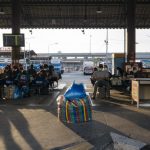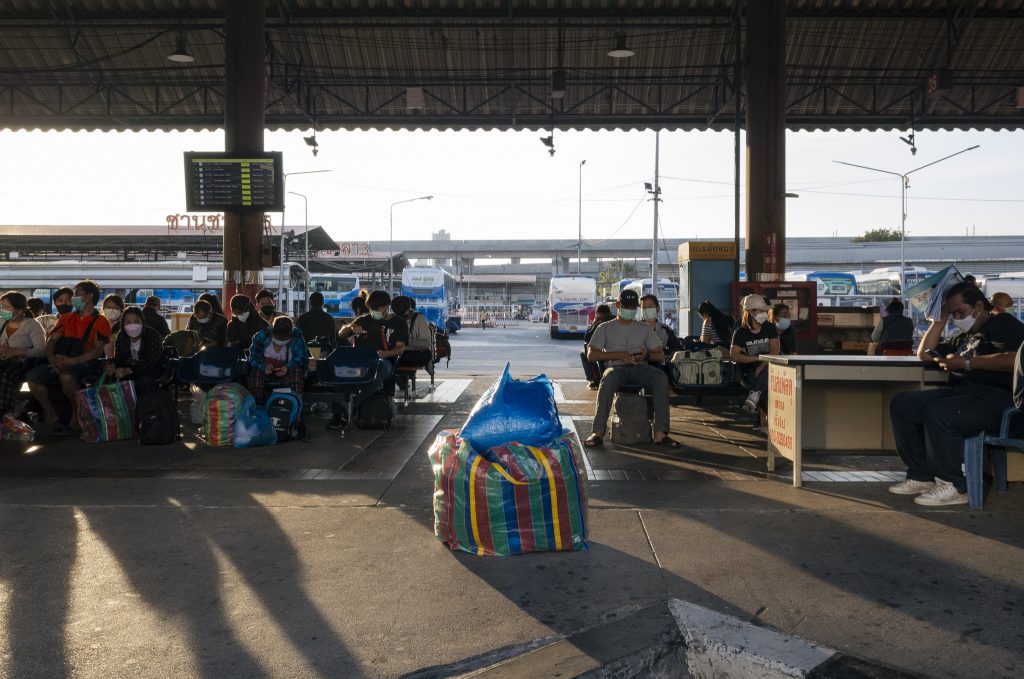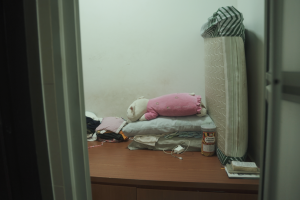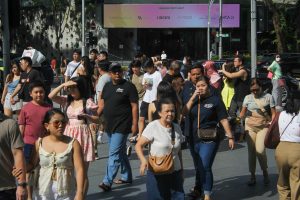All images: Watcharawit Phudork
Translated by: Wil Hathaway
THAILAND — Mo Chit on the eve of the long New Year’s weekend was a peculiar yet familiar sight: I thought I was well acquainted with this transport hub, but I certainly had never seen it this crowded. I expected it, but the experience still overwhelmed my senses.
For three hours, I wandered through Mo Chit Bus Terminal, gawking at the sheer number of migratory workers waiting to reunite with their loved ones hundreds of kilometres away—if only for a short while over New Year’s.
In those three hours, I also tried fruitlessly to rid myself of an earworm wriggling its way through my brain—a folk tune released in 1994, the year I was born, by the late Jaran Manopet, a celebrated singer-songwriter from my hometown of Chiang Mai in Northern Thailand.
The lyrics speak of the chills in December’s air and a longing for one’s home. The verses resounded in my head that afternoon, evoked by the sight of the mass exodus before me. Somehow those softly sung words befitted the scene.
According to the Ministry of Transport, nearly 10 million people leave Bangkok by train, plane and bus at the beginning of the New Year’s holidays only to come back less than a week later. That’s not including passengers of the 16 million private vehicles, whose number remains a mystery to the ministry.
This mass exodus at Mo Chit occurs year after year because these workers—most of whom come from Northeastern Thailand, the poorest region—feel obliged to go to Bangkok to earn a decent wage. Mo Chit has seen the majority of these travellers since it serves Northern and Northeastern bus routes.
The place I call home
I am a Chiang Mai girl through and through. Not only was I born and raised in this Northern Thai city—globally recognised for its rich cultural heritage and epitomic slow living—but I also attended university and received my first paycheque there. I would have never left if I could help it.
After graduation, my first job was an editorial position for a local magazine. The pay was meagre, but my cost of living was also negligible. There was no rent to pay, no restaurants that could beat my mother’s cooking, and no exorbitantly-priced public transport.
Unfortunately, the magazine ceased publication shortly after. My team was disbanded, and I had no choice but to swallow my pride and make my way to the big city to continue making a career out of my passion for the written word.
Needless to say, I was homesick.
The commonality of migrating
The afternoon of my visit to Mo Chit Bus Terminal, I spotted 52-year-old Chao and 44-year-old Dah sitting on a teal metal seat amongst the throng of travellers at Mo Chit Bus Terminal. On their left are a big multicolour sack, a backpack, and an oversized tote whose seams could burst at any moment.
Like me, the two Nan natives left their hometown in Northern Thailand to seek gainful employment in Bangkok.
Chao was a construction worker who had built countless sky-scraping luxury residences that he would never be able to afford. Dah came with him to Bangkok and got a job as a dry cleaner. The couple hadn’t seen their friends and family back home for quite some time, and their luggage included blankets and jackets to be gifted to their loved ones.
The pair told me they’d been ready to go home for a while. “We have five days off and two extra days of holiday on top of the three public holidays,” they explained. Most human resource managers in Bangkok would decline such a long holiday request. Still, tagging on a couple of days to a long weekend would never raise an eyebrow.
This common courtesy was the reason for Mo Chit’s current state of pandemonium.
Chao noted that he could easily find a construction job in Nan or Chiang Mai, but he couldn’t pass on Bangkok’s higher wages. Coming to the capital was an obvious choice.
When asked whether they’d ever planned on moving back home, Dah chimed in: “Of course, that’s crossed our mind, but we still got bills to pay. We have two daughters. Our eldest is now working in Bangkok, so she is all set, but our youngest is only in Grade 12. We still have many more years of [university] tuition to cover.”
Maybe I was a hopeless romantic, but the twinkle in their eyes told me that their daughters were their pride and joy and the very reason for their existence.
Both Chao and Dah agreed that the eventual return to their hometown was inevitable, but whether it would be sooner or later depended on their finances. They reasoned that they would have to start over as farmers, the only career choice within their realm of possibility. Still, farming would require a rather significant investment to start.
“You’re not going home?” Dah asks me, her voice gentle and caring.
“No, not this year,” I admitted.
Today, Mo Chit is visibly more crowded. The nearby corner store is swarming with patrons seeking necessities, sustenance, and other refreshments for their overnight journeys. Soon, flocks of soon-to-be passengers would have taken up the previously empty space on the floor around me.
The number of seats inside the terminal was insufficient for a crowd of this size. Still, I imagined that many of them would rather avoid sitting shoulder to shoulder with strangers during times of a deadly pandemic. Testing positive for Covid-19 would undoubtedly defeat the purpose of family gatherings.
Opportunity for growth
The younger me was fortunate to have been able to stay in my hometown and attend university. It’s not a luxury the majority of Thai students have. Most are compelled to move away and set up temporary homes, usually near the university they’re attending in pursuit of higher education.
That afternoon, I met Tah, a senior at the Faculty of Education of Srinakharinwirot University, majoring in psychology and counselling. He relocated to Bangkok to pursue a bachelor’s degree in his chosen field.
This year, he was a practicum teacher at a reputable school in Bangkok, but today, at Mo Chit Bus Terminal, he was heading to Chaiyaphum to visit his family.
“I don’t go home on every single holiday, but I’m broke right now, so I have to,” he joked.
“My family worries about my future. They are convinced it would be cheaper to get a job and live back home. Bangkok wages are higher, that’s for sure. But so is the cost of living. They are worried that I wouldn’t be able to live as well as I did back home.”
“I want to start in Bangkok because it offers a better chance for professional growth and better compensation. I feel like my career would stagnate back home. There’d be no way for me to become the next billionaire,” Tah mused. His friend, who was there to drop him off, burst into laughter.
Tah said that he wanted to eke a career in human resources and use his psychology and people management knowledge instead of becoming a full-fledged teacher. What he said reminded me of the paradigm shift amongst Thai students. In the past, graduates used to prefer government positions because of the guarantee of permanent employment. While job security then was once a priority, that’s no longer the case today. Today’s fresh graduates and current students are inclined towards the private sector and the potential it offers.
What’s not to like? As a civil servant, you will be offered the same salary bracket regardless of your location and capabilities. However, in the private sector, you will be more handsomely compensated, especially if you’re residing and working in Bangkok. And if your talent is in demand, many employers are willing to offer you more.
That said, fresh graduates typically earn a minimum of 15,000 Thai baht a month—insufficient if my personal experience is anything to go by.
An alternative path
In the food court of the bus terminal, I met Roong, a 25-year-old new mother from Rayong, travelling with her 10-month-old infant, Khaohom. Unlike most other travellers, they weren’t returning home. Instead, the mother-daughter duo was on their way to a new one. This trip would be Khaohom’s first time seeing her father and his family in Khon Kaen, an economic hub in Northeastern Thailand.
“We’ve been cooped up in our room. This is the first time we’ve been out, and it’s because we’re finally leaving Rayong behind,” Roong elaborated.
“After I found out I was pregnant, I had to come back to Rayong to look after my mother. She doesn’t know how to drive, and she lives on a rubber plantation, far from everything. It’s difficult for her because she can’t leave the house on her own,” Roong explained while keeping Khaohom entertained. It helps that this little girl had been cooperative so far, making the trip far less of a pain for Roong.
“Now my sister is with our mother, and my in-laws can finally see their granddaughter.”
Roong’s environments were indubitably harsher than mine. While her home was remote, and urbanism played a peripheral role in her life, she chose to work and live within her means. Roong planned to start over as a farmer on her husband’s land in Khon Kaen. The thought of working in the metropole never crossed her mind. Labouring in a factory or working in a department store counter held no appeal.
She also insisted that farming was more than bearable as long as she was in good health.
With Khaohom preoccupied with her bag of snacks, Roong picked up their bags, ready to board a third-class bus to their new home. For once, it wasn’t going to be Bangkok.
I bid farewell to the transiting mother and daughter, wishing them well for their new beginning in Khon Kaen. I hope Roong will not have to bite her own tongue—like I did three years ago—and make her way to Bangkok. The thought of Khaohom being left behind while one, if not both, of her parents, slogging away in the capital city is difficult to bear.
It’s a matter of choice
To be fair, many people prefer Bangkok over their hometown. I’m not one of them.
“There are jobs but not many choices. It’s hard to find what you love or even want to do,” Wan shares when I ask about her career options back home.
Ten years ago, she moved to Bangkok from Chiang Rai, a province north of where I stay. She now works in the logistics industry, which means Bangkok is a better location for her career. While there is a regional hub called Mae Sai up north, serving Thailand, Laos, and Myanmar, there aren’t nearly as many jobs, opportunities or choices.
“I’ve lived in Bangkok for ten years, so I’m used to the pace of life here. Everything is too slow in Chiang Rai,” Wan explains. “I think I was born in the wrong province. I wasn’t nearly as patient as everyone else.”
Wan has no plan to move back home. She was content with her livelihood and lifestyle in Bangkok.
Wan’s affinity for Bangkok is not peculiar—many others share Wan’s love for Bangkok. While I think this city is despicable, others perceive it as vibrant and energetic. People with grand ambitions and dreams come to Bangkok to make their dreams come true.
Coming back to Bangkok
As night fell, the terminal started filling up with more people. At a corner, snack boxes and bottles of water were stacked on top of one another, waiting to be handed out to the avalanche of passengers. These very same people would eventually come back to Bangkok at the end of the holidays.
While many do it because they love the city, countless others do so out of necessity. For a handful of its inhabitants, Bangkok may be sufficiently hospitable. Still, the idea that Bangkok is the only choice for a better life for my compatriots does not sit well at all with me. Year after year, young labourers and workers are forced to migrate to the City of Angels to pursue their dreams and earn a decent-enough living. That’s why the Thai capital city is overpopulated. It even holds world records for traffic congestion and air toxicity.
I know that urban migration is far from being unique to Bangkok. Despite being less liveable for minimum wage earners, this mass migration continues, exacerbating the economic development of other provinces. There aren’t enough people in the local workforce to drive them forward.
If I didn’t think this place could accommodate more passengers, I was soon proven wrong. At nightfall, even more travellers swarmed, and I took that as my cue to leave.
Hopefully, they would one day find a job they could love in their hometown, and we could finally put an end to this annual mass exodus.







